【BBC六分钟英语】气候变化如何影响动物迁徙?
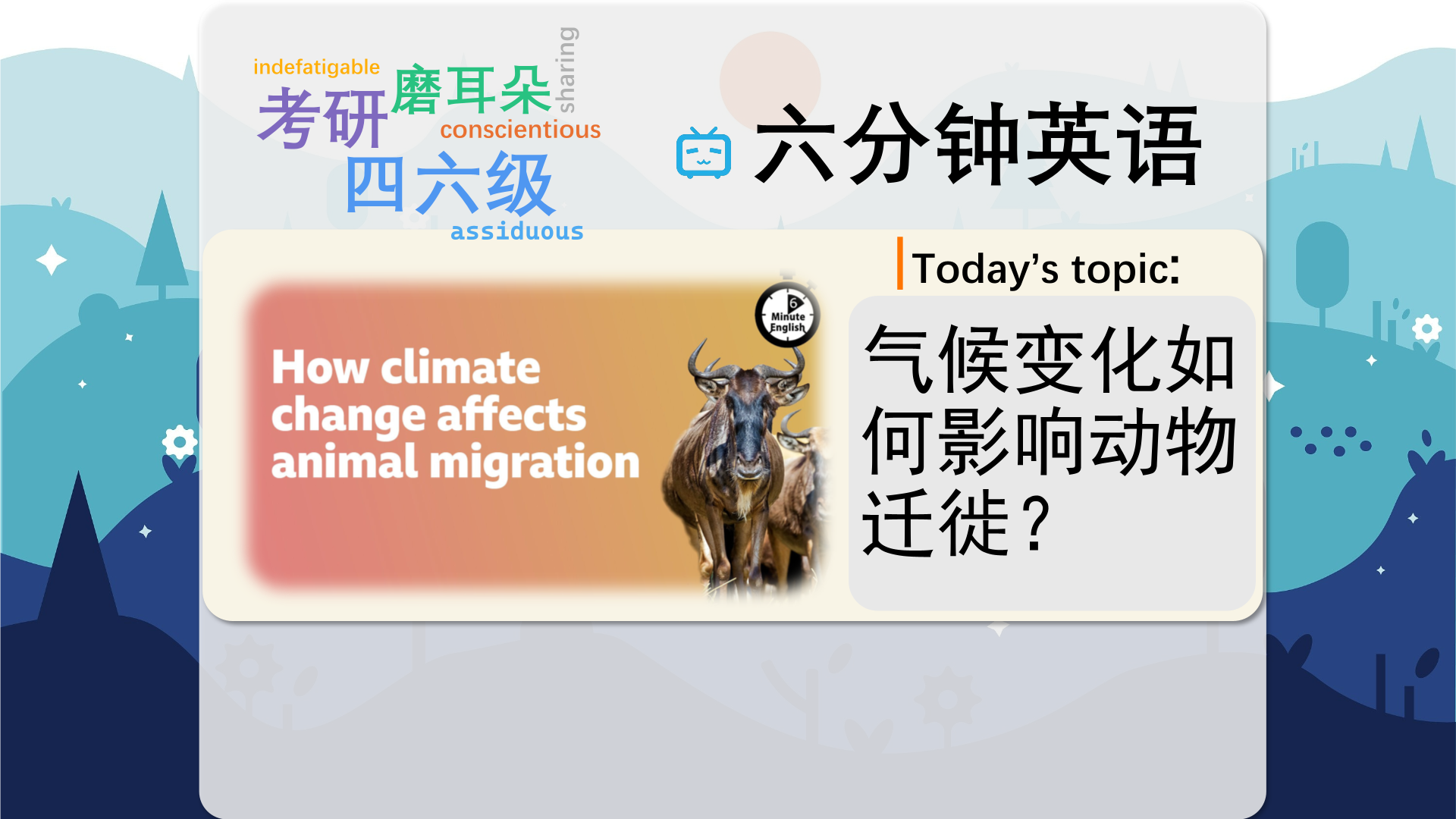
【英文脚本】
Beth
Hello and welcome to 6 Minute English from BBC Learning English. I’m Beth.
Neil
And I’m Neil. You can find a transcript and worksheet for this podcast on our website bbclearningenglish.com.
Beth
So Neil, today we’re talking about animal migration: that’s the movement of animals from one place to another, usually because of the weather or temperature.
Neil
Yes. For example, wildebeest are famous for their migration. They travel around the Serengeti in Tanzania and the Maasai Mara in Kenya every year depending on the rain. It’s often called The Great Migration.
Beth
Yes, and I have a question for you about this, Neil. How many animals are thought to take part in The Great Migration every year? Is it: a) 1 million b) 1.5 million c) 2.5 million
Neil
Well, I don’t know… but I’m going to guess 2.5 million.
Beth
OK. I’ll reveal the answer at the end of the programme. Now, wildebeest are not the only animals who travel large distances.
Neil
That’s right. Many sharks also migrate, they move to a different place because of the weather or temperature.
Beth
Trisha Atwood researches sharks and their migration for Utah State University and explained more to BBC World Service programme, The Climate Question.
Trisha
Animals migrate for all types of reasons. So, some of them migrate for food resources, things like mating or for giving birth.
Neil
So, animals can migrate for food, mating and giving birth. Host of BBC World Service’s The Climate Question, Sophie Eastaugh, wanted to know more.
Sophie
And what kind of distances are we talking with these migrations? Are they covering huge swathes of ocean?
Trisha
Some of these shark species can travel massive distances. We’ve seen great white sharks that have travelled from the coast off of Perth, Australia, all the way to South Africa.
Beth
Sophie asks, “What kinds of distances are we talking with these migrations?” This is an informal way to ask, “How far are the migrations?” We can rephrase lots of questions in this way. For example, you could ask “What kind of price are we talking?” to ask how much something costs.
Neil
Sophie goes on to ask whether sharks travel across huge swathes of ocean. Swathes of ocean means large areas of ocean.
Beth
Yes, and in fact, sharks do travel across large areas. For example, great white sharks can travel from Australia to South Africa. That is a long way to swim!
Neil
But, as climate change causes changes to the temperature of the ocean, it’s changing the way that sharks migrate.
Beth
This is a problem; sharks scare away other creatures, such as sea turtles, and these creatures eat seagrass, which absorbs a lot of carbon from the atmosphere.
Neil
So, basically, when the sharks are around, there’s more seagrass on the ocean floor and so more carbon is absorbed. So, sharks can actually help fight climate change.
Beth
Yes. In fact, lots of species that migrate are really important for fighting climate change. Let’s hear more from BBC World Service programme, The Climate Question.
Sophie
Sharks aren’t the only migratory animal that acts as a secret weapon against climate change.
Trisha
Research that we worked on shows that by just managing about 10 groups of animals we could be taking out or sequestering more CO2 from the atmosphere by about six gigatonnes of carbon per year.
Sophie
So, for perspective, some experts say that we need to suck 10 gigatonnes of CO2 a year out of the atmosphere to meet our climate goals.
Neil
Sophie says that many animals that migrate, like sharks, are a secret weapon against climate change. A secret weapon is something nobody knows about that will give you an advantage over a problem or enemy.
Beth
By protecting sharks and other animals that migrate, Trisha’s research shows that we could be sequestering six gigatonnes of carbon dioxide, or CO2, a year from the atmosphere. Sequester means remove and store the carbon, for example in plants like seagrass.
Neil
Six gigatonnes is a lot of carbon! Sophie says that, for perspective, it’s about 60% of the amount of carbon dioxide that some scientists believe we need to remove from the atmosphere each year. We can use the phrase ‘for perspective’ to explain the size or importance of something, particularly when it’s difficult to imagine that thing.
Beth
Alongside sharks, another species that Trisha believes is important to helping remove carbon dioxide from the atmosphere is the wildebeest.
Neil
Yes, and that reminds me of your question, Beth. You asked me how many animals take part in The Great Migration, and I think I went for option c) 2.5 million. Was I right?
Beth
You weren’t, I’m afraid. The answer was b) 1.5 million, so still a lot of animals. OK. Let’s recap the vocabulary we’ve learned, starting with migrate: move to a different place. For animals, this is usually because of the weather or temperature.
Neil
We can use the structure ‘What kind of (something) are we talking?’ to rephrase a question more informally, particularly one about distance, cost or numbers. For example, “What kind of distance are we talking?”
Beth
Swathes means large areas of something.
Neil
A secret weapon is something nobody knows about that gives you an advantage over a problem or enemy.
Beth
If you sequester something, such as carbon dioxide, you remove it and store it.
Neil
And we can use the phrase ‘for perspective’ to explain the size or importance of something, particularly if that thing is difficult to imagine.
Beth
Once again, our six minutes are up. Why not test what you’ve learned using the interactive quiz on our website? Bye for now!
Neil
Goodbye.
【中英文双语脚本】
Beth(贝丝)
Hello and welcome to 6 Minute English from BBC Learning English. I’m Beth.
您好,欢迎来到 BBC Learning English 的 6 Minute English。我是贝丝。
Neil(尼尔)
And I’m Neil. You can find a transcript and worksheet for this podcast on our website bbclearningenglish.com.
我是 Neil。您可以在我们的网站上找到此播客的文字记录和工作表 bbclearningenglish.com。
Beth(贝丝)
So Neil, today we’re talking about animal migration: that’s the movement of animals from one place to another, usually because of the weather or temperature.
所以 Neil,今天我们谈论的是动物迁徙:这是动物从一个地方移动到另一个地方,通常是因为天气或温度。
Neil(尼尔)
Yes. For example, wildebeest are famous for their migration. They travel around the Serengeti in Tanzania and the Maasai Mara in Kenya every year depending on the rain. It’s often called The Great Migration.
是的。例如,角马以其迁徙而闻名。他们每年都会根据降雨情况在坦桑尼亚的塞伦盖蒂和肯尼亚的马赛马拉周围旅行。它通常被称为大迁徙。
Beth(贝丝)
Yes, and I have a question for you about this, Neil. How many animals are thought to take part in The Great Migration every year? Is it: a) 1 million b) 1.5 million c) 2.5 million
是的,我有一个问题要问你,Neil。据信每年有多少动物参加大迁徙?是: a) 100 万 b) 150 万 c) 250 万
Neil(尼尔)
Well, I don’t know… but I’m going to guess 2.5 million.
我不知道。。。但我猜是 250 万。
Beth(贝丝)
OK. I’ll reveal the answer at the end of the programme. Now, wildebeest are not the only animals who travel large distances.
还行。我将在节目结束时揭示答案。现在,角马并不是唯一长途跋涉的动物。
Neil(尼尔)
That’s right. Many sharks also migrate, they move to a different place because of the weather or temperature.
没错。许多鲨鱼也会迁徙,由于天气或温度,它们会搬到不同的地方。
Beth(贝丝)
Trisha Atwood researches sharks and their migration for Utah State University and explained more to BBC World Service programme, The Climate Question.
特丽莎·阿特伍德 (Trisha Atwood) 为犹他州立大学研究鲨鱼及其迁徙,并向 BBC 国际频道节目《气候问题》进行了更多解释。
Trisha(特丽莎)
Animals migrate for all types of reasons. So, some of them migrate for food resources, things like mating or for giving birth.
动物迁徙的原因有很多。因此,它们中的一些迁移是为了食物资源,比如交配或生育。
Neil(尼尔)
So, animals can migrate for food, mating and giving birth. Host of BBC World Service’s The Climate Question, Sophie Eastaugh, wanted to know more.
因此,动物可以迁徙以获取食物、交配和分娩。BBC 国际频道 (BBC World Service) 的《气候问题》(The Climate Question) 主持人索菲·伊斯托 (Sophie Eastaugh) 想了解更多。
Sophie(苏菲)
And what kind of distances are we talking with these migrations? Are they covering huge swathes of ocean?
我们与这些迁移谈论的距离是什么样的?它们覆盖了大片的海洋吗?
Trisha(特丽莎)
Some of these shark species can travel massive distances. We’ve seen great white sharks that have travelled from the coast off of Perth, Australia, all the way to South Africa.
其中一些鲨鱼物种可以传播很长的距离。我们看到了从澳大利亚珀斯 (Perth) 海岸一直到南非的大白鲨。
Beth(贝丝)
Sophie asks, “What kinds of distances are we talking with these migrations?” This is an informal way to ask, “How far are the migrations?” We can rephrase lots of questions in this way. For example, you could ask “What kind of price are we talking?” to ask how much something costs.
Sophie 问道:“我们与这些迁移交谈的距离是什么样的?这是一种非正式的提问方式,“迁移进展如何?我们可以以这种方式重新表述很多问题。例如,您可以询问 ‘What type an price are talk what type price?’ 来询问某物的成本是多少。
Neil(尼尔)
Sophie goes on to ask whether sharks travel across huge swathes of ocean. Swathes of ocean means large areas of ocean.
Sophie 继续询问鲨鱼是否穿越了大片海洋。大片海洋是指大面积的海洋。
Beth(贝丝)
Yes, and in fact, sharks do travel across large areas. For example, great white sharks can travel from Australia to South Africa. That is a long way to swim!
是的,事实上,鲨鱼确实会穿越大片区域。例如,大白鲨可以从澳大利亚旅行到南非。那是一条很长的路要走!
Neil(尼尔)
But, as climate change causes changes to the temperature of the ocean, it’s changing the way that sharks migrate.
但是,随着气候变化导致海洋温度的变化,它正在改变鲨鱼的迁徙方式。
Beth(贝丝)
This is a problem; sharks scare away other creatures, such as sea turtles, and these creatures eat seagrass, which absorbs a lot of carbon from the atmosphere.
这是一个问题;鲨鱼会吓跑其他生物,例如海龟,这些生物吃海草,海草会从大气中吸收大量碳。
Neil(尼尔)
So, basically, when the sharks are around, there’s more seagrass on the ocean floor and so more carbon is absorbed. So, sharks can actually help fight climate change.
所以,基本上,当鲨鱼在附近时,海底有更多的海草,因此吸收的碳也就越多。因此,鲨鱼实际上可以帮助应对气候变化。
Beth(贝丝)
Yes. In fact, lots of species that migrate are really important for fighting climate change. Let’s hear more from BBC World Service programme, The Climate Question.
是的。事实上,许多迁徙的物种对于应对气候变化非常重要。让我们听听 BBC 世界服务节目《气候问题》的更多内容。
Sophie(苏菲)
Sharks aren’t the only migratory animal that acts as a secret weapon against climate change.
鲨鱼并不是唯一一种作为对抗气候变化的秘密武器的迁徙动物。
Trisha(特丽莎)
Research that we worked on shows that by just managing about 10 groups of animals we could be taking out or sequestering more CO2 from the atmosphere by about six gigatonnes of carbon per year.
我们所做的研究表明,仅通过管理大约 10 组动物,我们每年就可以从大气中去除或封存更多的二氧化碳,减少约 6 吉吨的碳。
Sophie(苏菲)
So, for perspective, some experts say that we need to suck 10 gigatonnes of CO2 a year out of the atmosphere to meet our climate goals.
因此,从长远来看,一些专家表示,我们每年需要从大气中吸收 10 吉吨的二氧化碳才能实现我们的气候目标。
Neil(尼尔)
Sophie says that many animals that migrate, like sharks, are a secret weapon against climate change. A secret weapon is something nobody knows about that will give you an advantage over a problem or enemy.
索菲说,许多迁徙的动物,如鲨鱼,是对抗气候变化的秘密武器。秘密武器是没人知道的东西,它会让你比问题或敌人更有优势。
Beth(贝丝)
By protecting sharks and other animals that migrate, Trisha’s research shows that we could be sequestering six gigatonnes of carbon dioxide, or CO2, a year from the atmosphere. Sequester means remove and store the carbon, for example in plants like seagrass.
Trisha 的研究表明,通过保护鲨鱼和其他迁徙的动物,我们每年可以从大气中封存 6 吉吨的二氧化碳 (CO2)。Sequester 的意思是去除和储存碳,例如在海草等植物中。
Neil(尼尔)
Six gigatonnes is a lot of carbon! Sophie says that, for perspective, it’s about 60% of the amount of carbon dioxide that some scientists believe we need to remove from the atmosphere each year. We can use the phrase ‘for perspective’ to explain the size or importance of something, particularly when it’s difficult to imagine that thing.
六十亿吨是很多碳!Sophie 说,从长远来看,这大约是一些科学家认为我们每年需要从大气中去除的二氧化碳量的 60%。我们可以使用“for perspective”这个短语来解释某物的大小或重要性,尤其是当很难想象那件事时。
Beth(贝丝)
Alongside sharks, another species that Trisha believes is important to helping remove carbon dioxide from the atmosphere is the wildebeest.
除了鲨鱼,Trisha 认为另一个对帮助去除大气中二氧化碳很重要的物种是角马。
Neil(尼尔)
Yes, and that reminds me of your question, Beth. You asked me how many animals take part in The Great Migration, and I think I went for option c) 2.5 million. Was I right?
是的,这让我想起了你的问题,贝丝。你问我有多少动物参加了大迁徙,我想我选择了选项 c) 250 万只。我是对的吗?
Beth(贝丝)
You weren’t, I’m afraid. The answer was b) 1.5 million, so still a lot of animals. OK. Let’s recap the vocabulary we’ve learned, starting with migrate: move to a different place. For animals, this is usually because of the weather or temperature.
恐怕你没有。答案是 b) 150 万只,所以仍然有很多动物。还行。让我们回顾一下我们学到的词汇,从 migrate: move to a different place 开始。对于动物来说,这通常是因为天气或温度。
Neil(尼尔)
We can use the structure ‘What kind of (something) are we talking?’ to rephrase a question more informally, particularly one about distance, cost or numbers. For example, “What kind of distance are we talking?”
我们可以使用结构 ‘What kind of (something) we are talking?’ 来更非正式地改写一个问题,特别是关于距离、成本或数字的问题。例如,’我们在谈论什么样的距离?
Beth(贝丝)
Swathes means large areas of something.
Swathes 的意思是某物的大面积。
Neil(尼尔)
A secret weapon is something nobody knows about that gives you an advantage over a problem or enemy.
秘密武器是没人知道的东西,它让你比问题或敌人更有优势。
Beth(贝丝)
If you sequester something, such as carbon dioxide, you remove it and store it.
如果您封存了某些东西,例如二氧化碳,您可以将其取出并储存起来。
Neil(尼尔)
And we can use the phrase ‘for perspective’ to explain the size or importance of something, particularly if that thing is difficult to imagine.
我们可以使用“for perspective”这个短语来解释某物的大小或重要性,特别是当那件事很难想象时。
Beth(贝丝)
Once again, our six minutes are up. Why not test what you’ve learned using the interactive quiz on our website? Bye for now!
我们的六分钟又结束了。为什么不通过我们网站上的互动测验来测试您学到的知识呢?再见!
Neil(尼尔)
Goodbye.
再见。

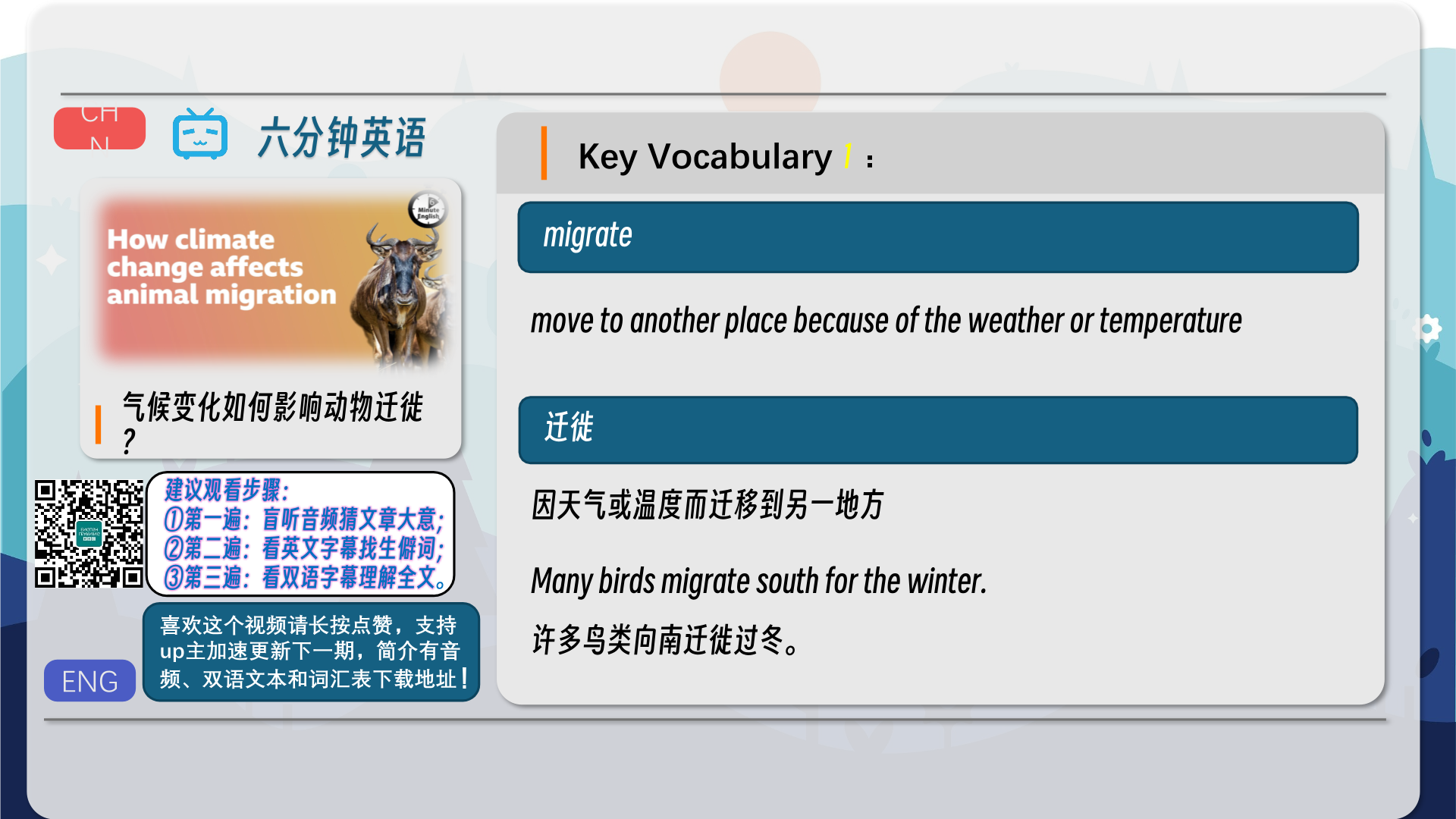
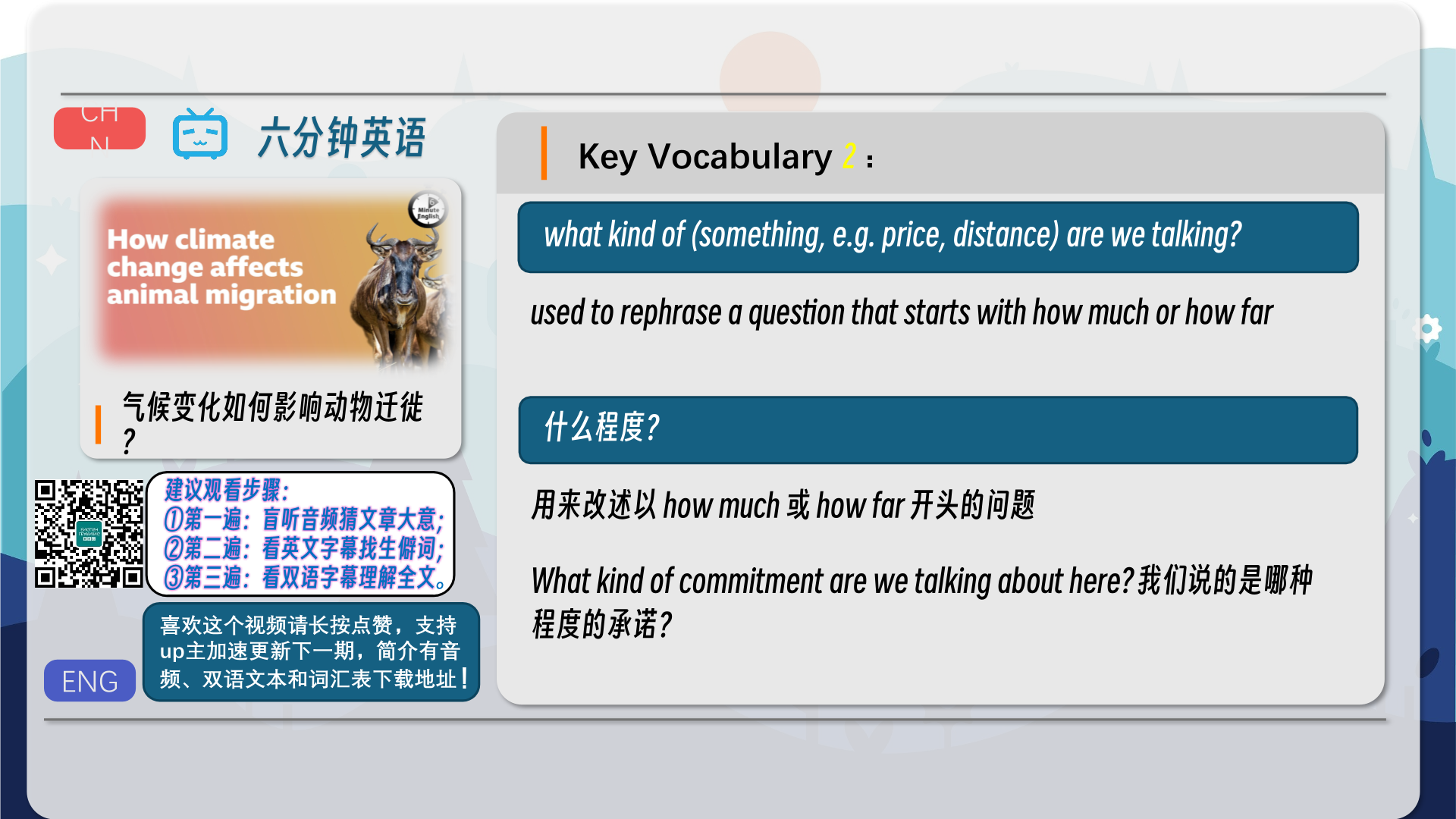
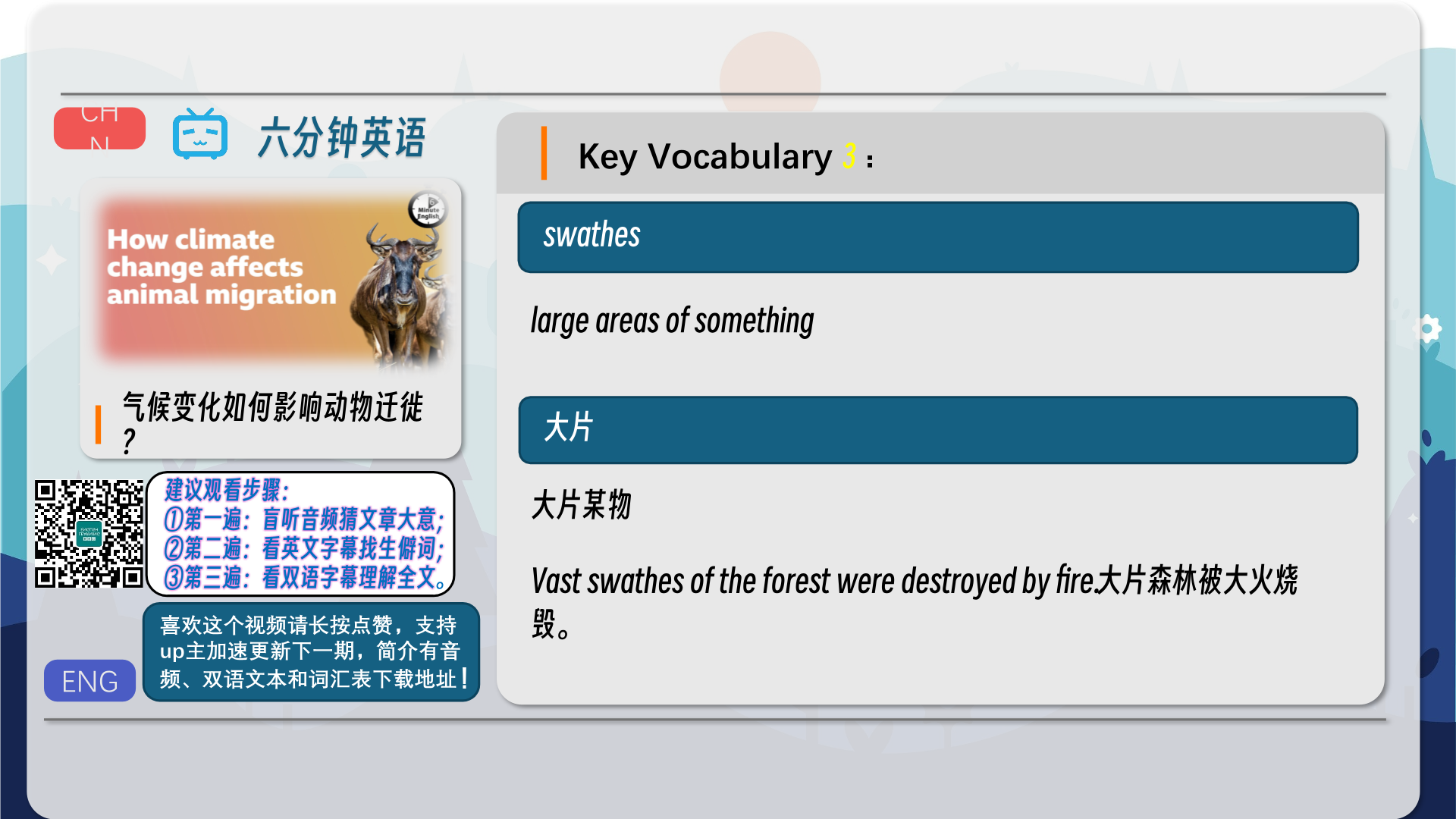

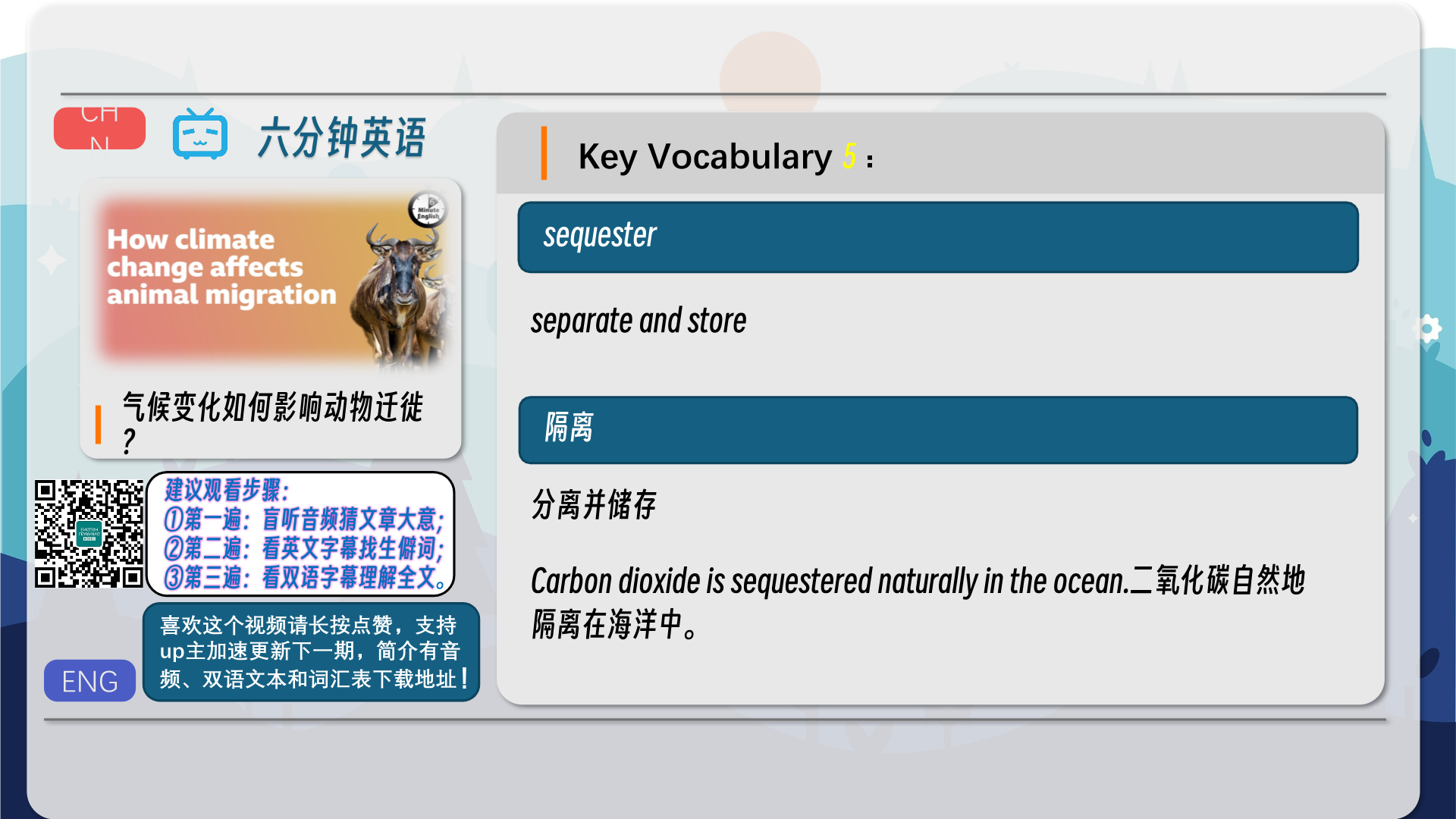
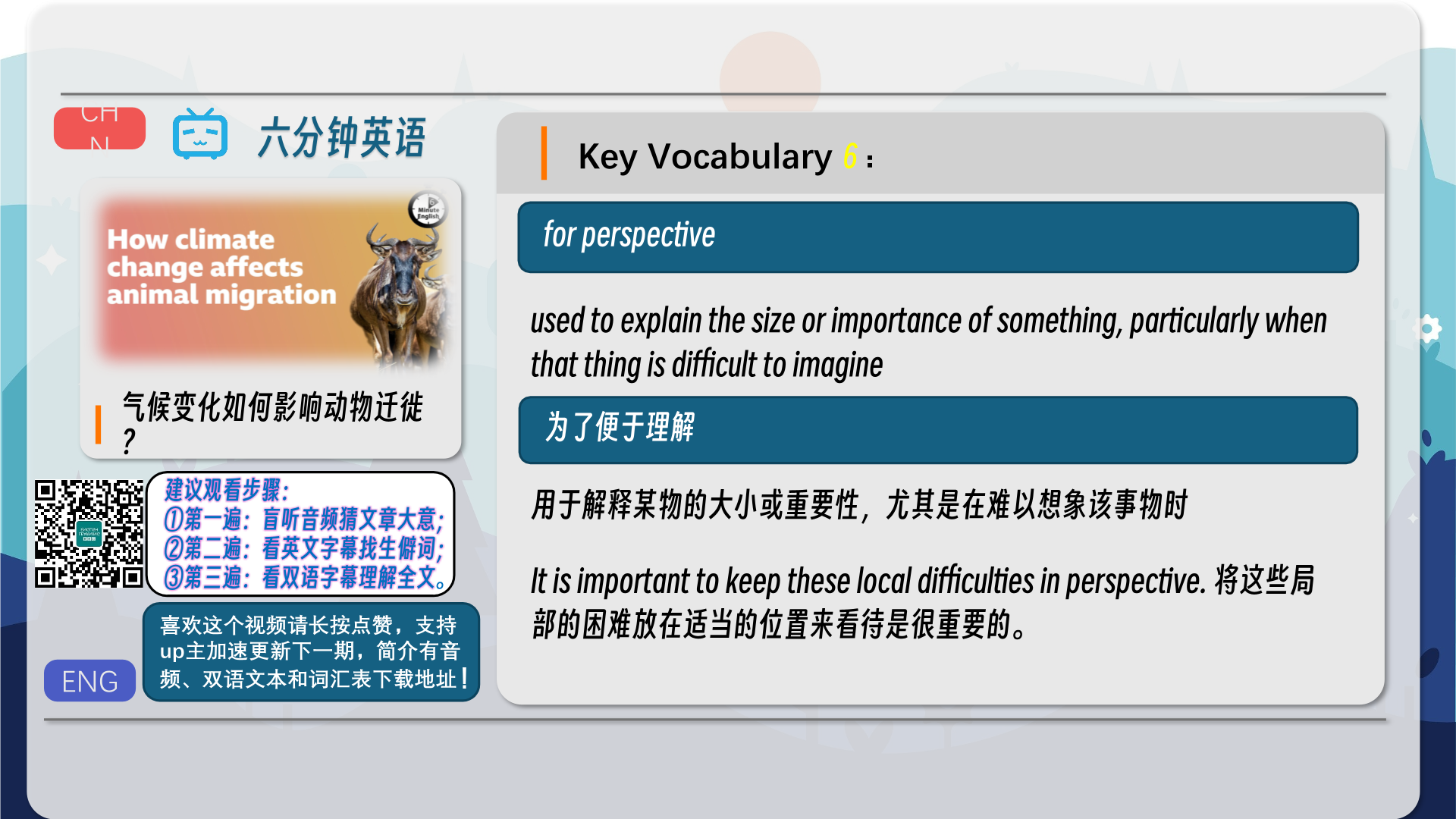
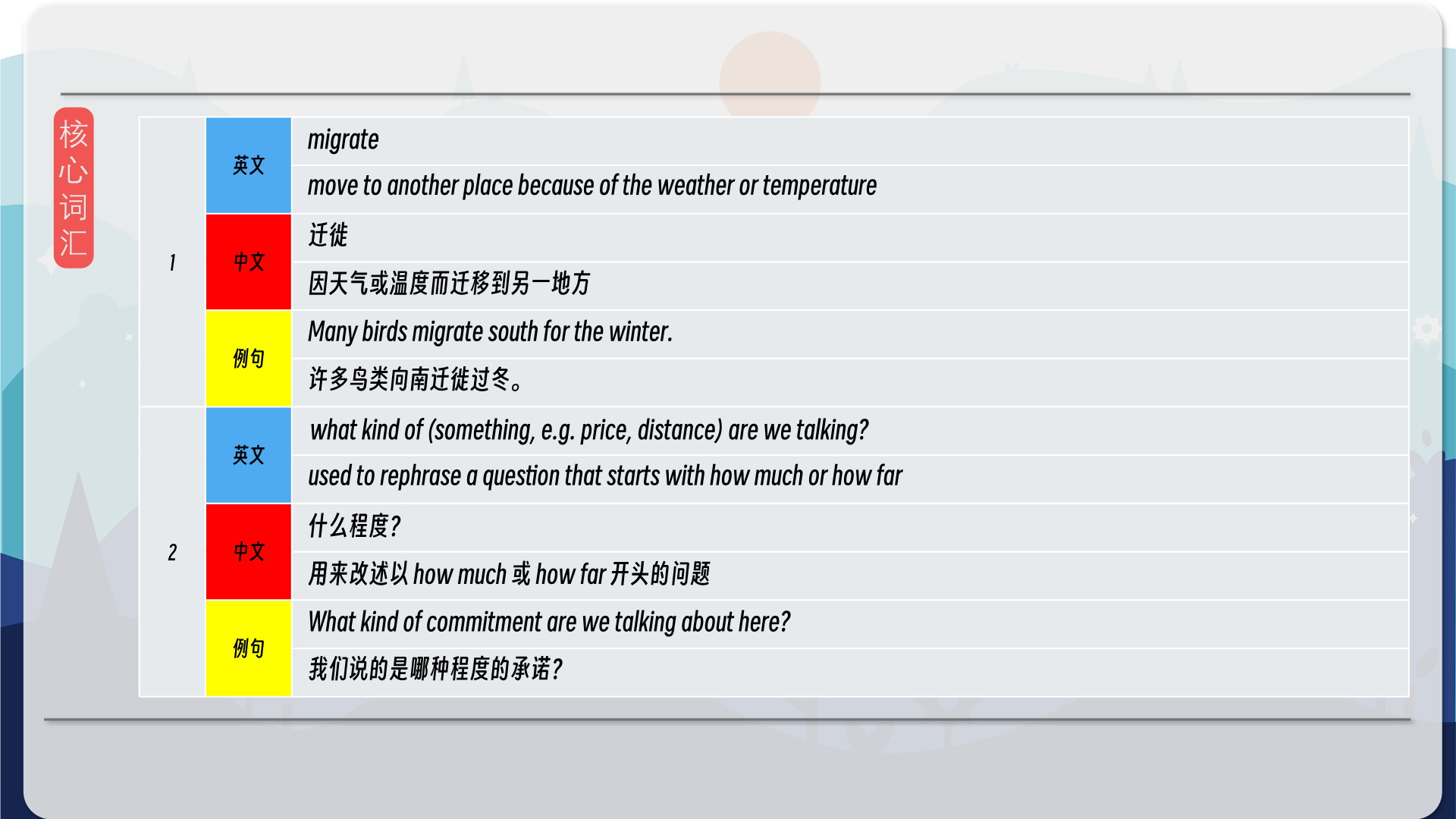
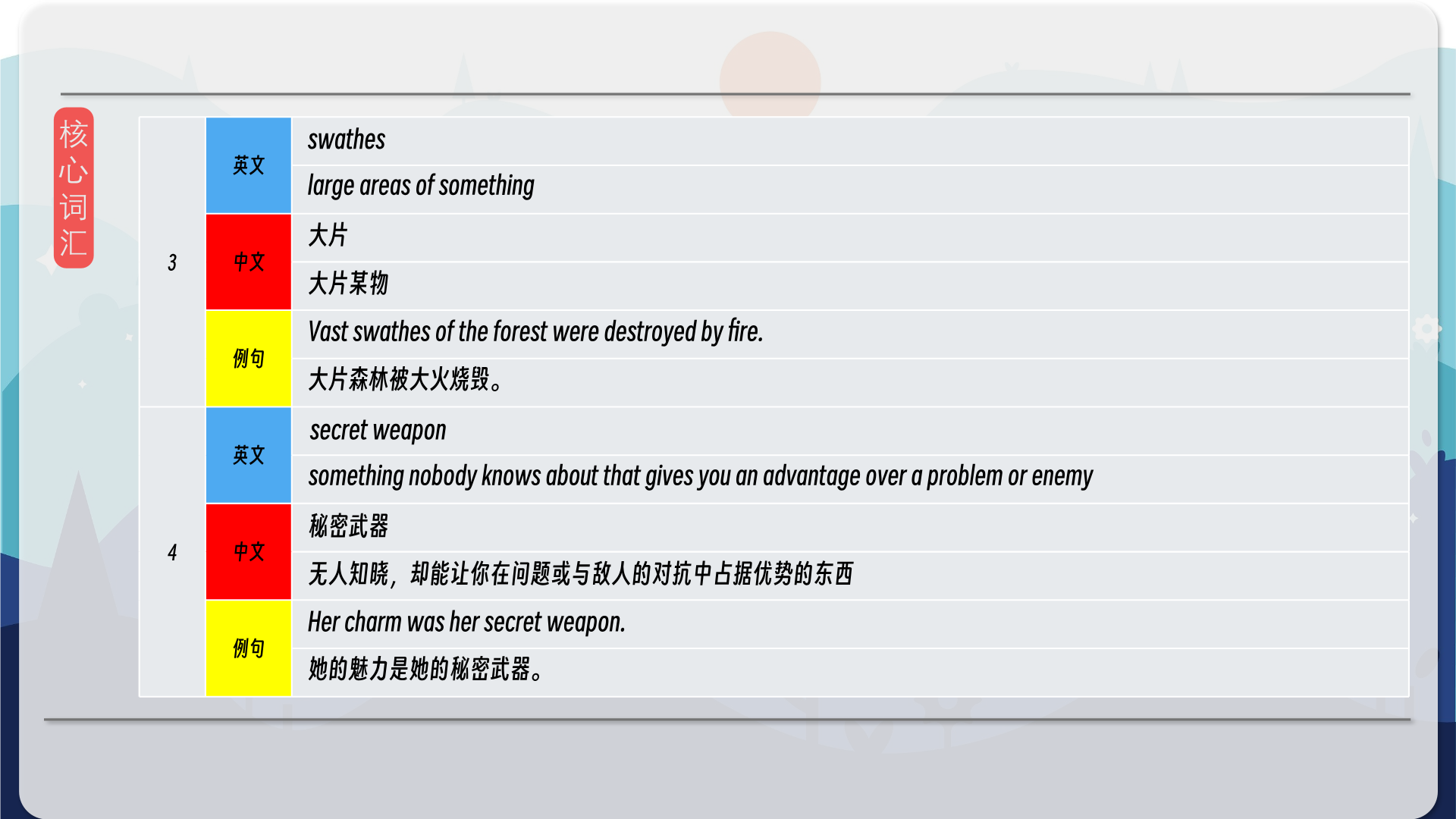
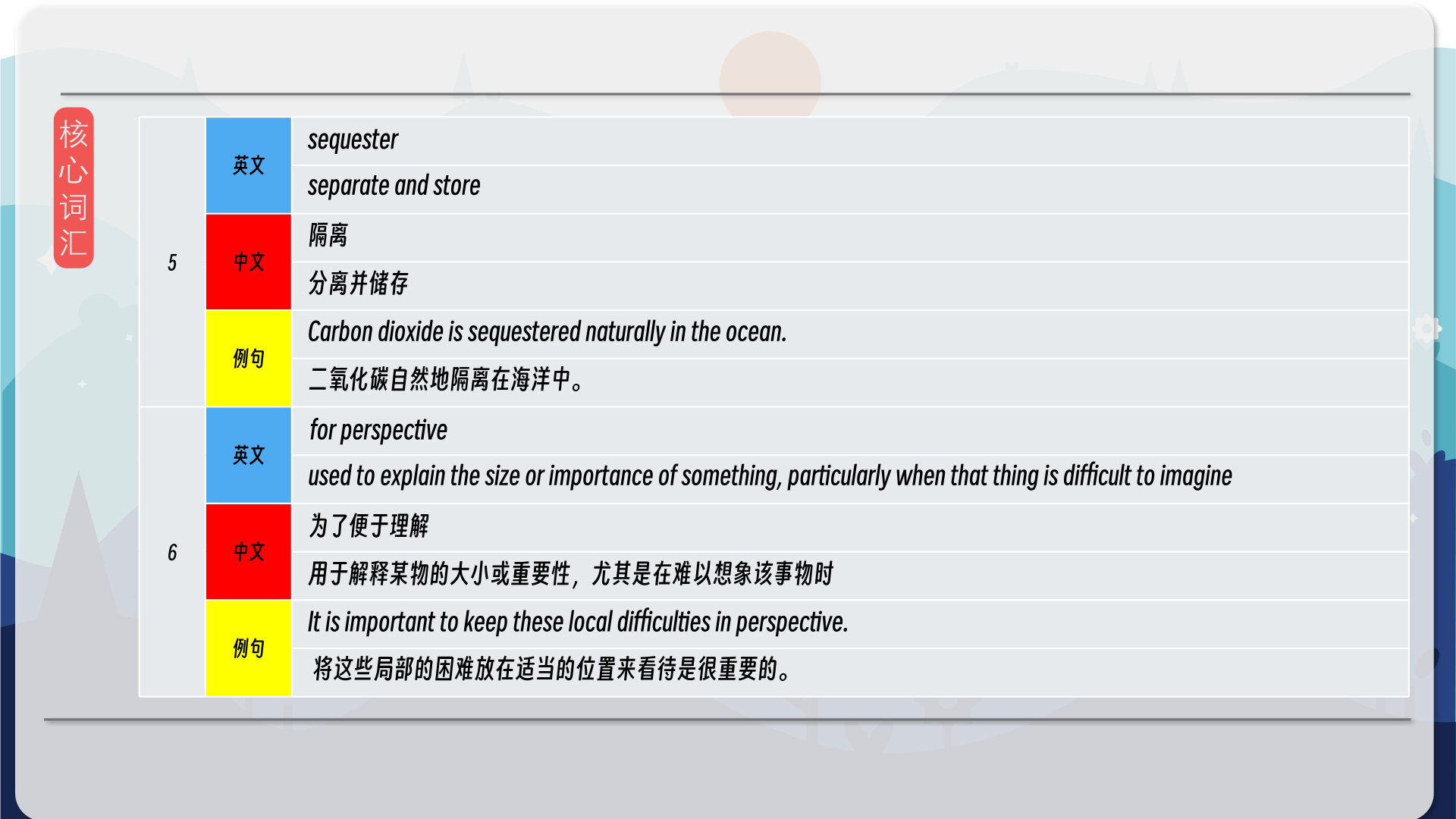
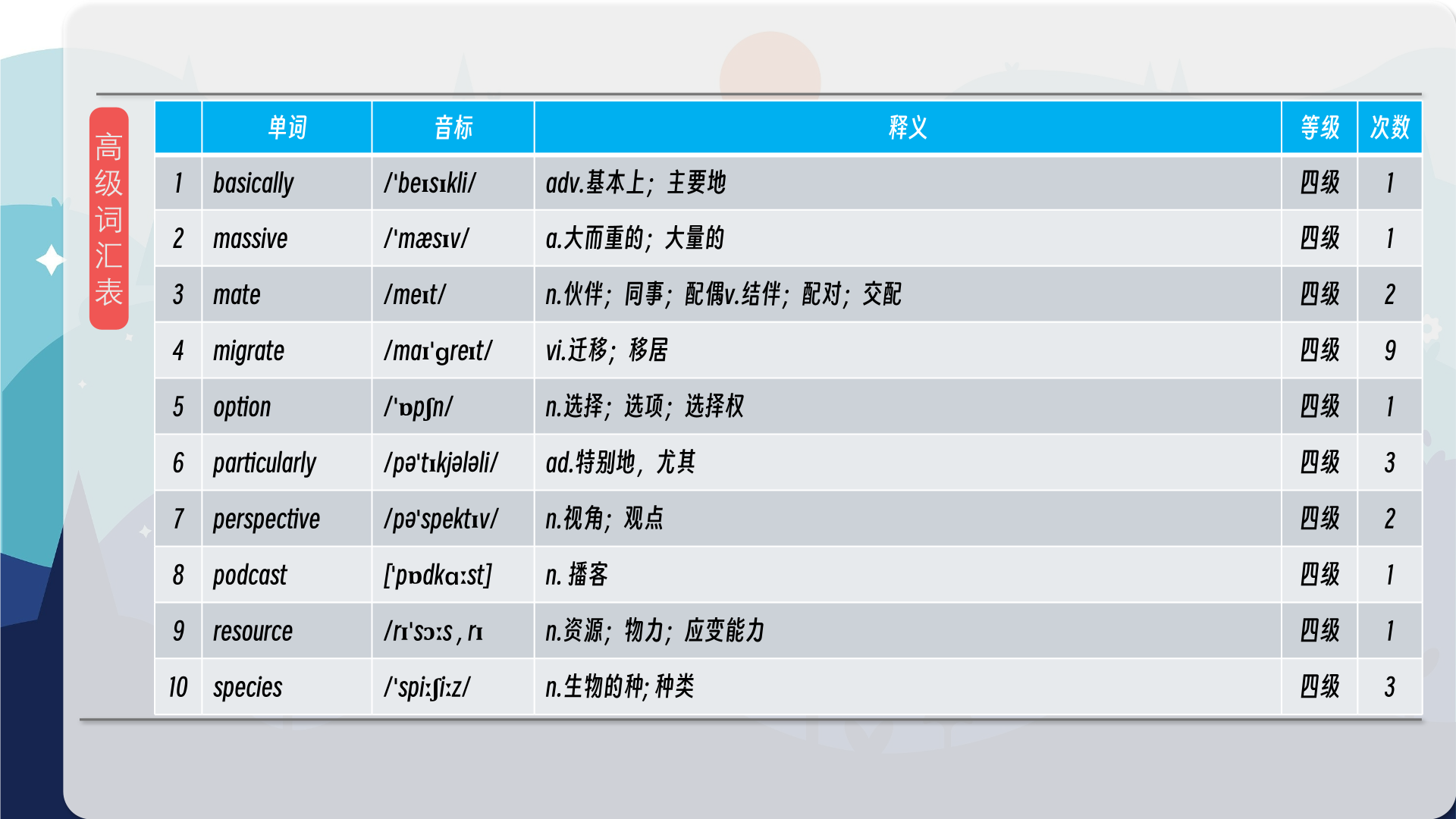


【核心词汇】
migrate
move to another place because of the weather or temperature
迁徙
因天气或温度而迁移到另一地方
Many birds migrate south for the winter.
许多鸟类向南迁徙过冬。
what kind of (something, e.g. price, distance) are we talking?
used to rephrase a question that starts with how much or how far
什么程度?
用来改述以 how much 或 how far 开头的问题
What kind of commitment are we talking about here?
我们说的是哪种程度的承诺?
swathes
large areas of something
大片
大片某物
Vast swathes of the forest were destroyed by fire.
大片森林被大火烧毁。
secret weapon
something nobody knows about that gives you an advantage over a problem or enemy
秘密武器
无人知晓,却能让你在问题或与敌人的对抗中占据优势的东西
Her charm was her secret weapon.
她的魅力是她的秘密武器。
sequester
separate and store
隔离
分离并储存
Carbon dioxide is sequestered naturally in the ocean.
二氧化碳自然地隔离在海洋中。
for perspective
used to explain the size or importance of something, particularly when that thing is difficult to imagine
为了便于理解
用于解释某物的大小或重要性,尤其是在难以想象该事物时
It is important to keep these local difficulties in perspective.
将这些局部的困难放在适当的位置来看待是很重要的。
在公众号里输入6位数字,获取【对话音频、英文文本、中文翻译、核心词汇和高级词汇表】电子档,6位数字【暗号】在文章的最后一张图片,如【220728】,表示22年7月28日这一期。公众号没有的文章说明还没有制作相关资料。年度合集在B站【六分钟英语】工房获取,每年共计300+文档,感谢支持!